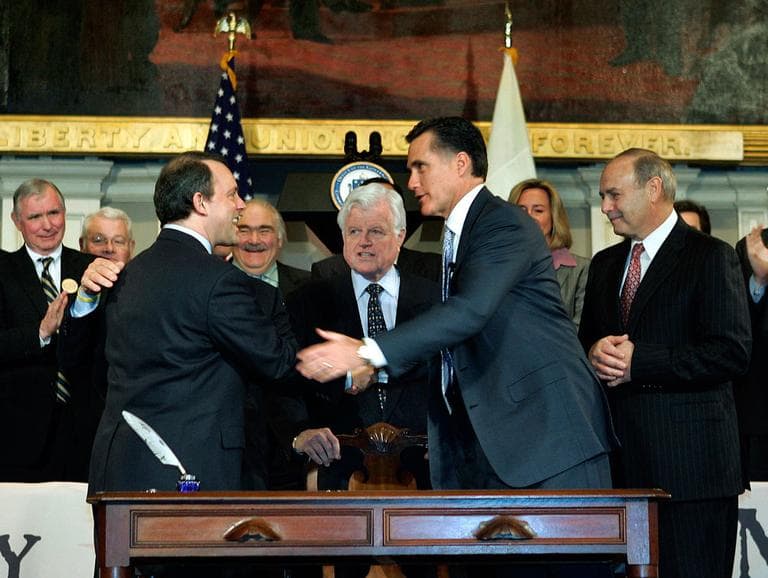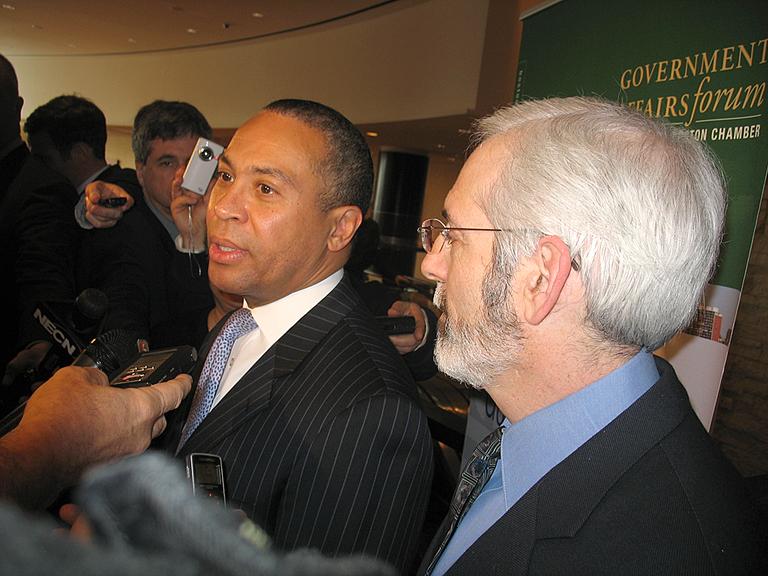Advertisement
State Legislature Readies Next Chapter Of Health Care Reform
Massachusetts is trying to make history in health care, again. After passing a health coverage law that became a model for the country, the Legislature is gearing up for a whirlwind run at health care costs. The House and Senate plan to roll out separate bills soon that will launch the next round of health care reform in Massachusetts.
Chapter one of the great Massachusetts health care novel — what some people call health reform 1.0 — built to this dramatic moment.

"Massachusetts once again is taking a giant leap forward,” former Gov. Mitt Romney told a packed house at Faneuil Hall in April 2006.
Some supporters of the new law claimed that covering more of the state’s uninsured residents, especially young adults, would bring down health care costs. But John McDonough, who ran the consumer group Health Care for All back in 2006, said health care costs were an afterthought at the time.
That soon changed.
“Passage of the 2006 law created this recognition that if we didn’t control health care spending, it was going to be awfully hard to hold this new law together,” McDonough recalled.
Rising health care costs also were becoming the top concern for small business owners and municipal leaders who were cutting jobs just so they could pay for health insurance. The Legislature passed a series of bills that chipped away at the problem. But there was no consensus on a major change.
Then the state's Group Insurance Commission decided that the best way to save money and improve care would be to stop paying doctors and hospitals for every office visit, test or procedure and put them on a budget to save money. Those budgets would have incentives to keep patients healthy.
Dolores Mitchell, director of the Group Insurance Commission, spoke in 2009 just after the commission vote.
Advertisement
“We’re suggesting a total revision in the way procedures work and the way billing works and the way doctors relate to one another, and to the hospitals with which they affiliate,” Mitchell said. “That’s a very meaningful change.”
The change to what are called "global payments" took off from here, led by the state's largest insurer, Blue Cross Blue Shield of Massachusetts. Insurers, hospitals and doctors were worried about what the state might require them to do, so they started voluntarily switching to contracts based on a global payment.
Gov. Deval Patrick stepped up the pressure by rejecting small business premium increases he said were too high. Several insurers took him to court. It looked like the insurers would prevail, but they withdrew their lawsuits.

Then a year ago February, at a Greater Boston Chamber of Commerce breakfast, we heard the first draft of chapter two in the great Massachusetts health care novel — health 2.0 to some. Patrick outlined a major bill that would give government more authority over health care spending for years to come.
“If the legislation I’ve filed feels like pressure on the market... Good. Good,” Patrick said. “That’s exactly what it’s intended to do.”
Now health care spending is slowing down. The market, under some pressure, may be correcting itself. Many economists think the main reason is that patients have been seeking less care during the recession. But whatever the cause, lower spending prompts the question: are rising health care costs still an urgent problem?
Harvard economics professor David Cutler, who is advising most of the Massachusetts players in this debate, argues that the Legislature must still take action.
“There are periods of time when folks can do heroic things, and they can have a meaningful impact," Cutler said. "But those [periods] peter out unless the fundamentals are in place. We now know of things that are working, so we need to build on things that are working.”
The House and Senate are expected to build on movements that are already under way: global payments, electronic health records and the increased focus on primary care. The House point person on health care, Steven Walsh, has outlined his proposals in meetings with dozens of groups.
Legislators are considering some controversial moves.
The Senate has talked about taxing insurance company profits. One House leader has a proposal to close the gap in payments to rich and poor hospitals.
There’s a vigorous debate about how aggressive the state should be in trying to hold down health care costs.
Health care is 18 percent of the Massachusetts economy. Trying to reorganize and reduce health care spending without hurting the health care industry is a high-stakes gamble. And, as Cutler points out, the nation is watching.
“A few years ago, Massachusetts was the first state in the country to decide that we can and we will cover everybody,” Cutler said. “And then the rest of the country followed. Now is our opportunity to show that we can make the health care system work for everybody. And if we do that then the rest of the nation will follow as well.”
This program aired on May 3, 2012.
